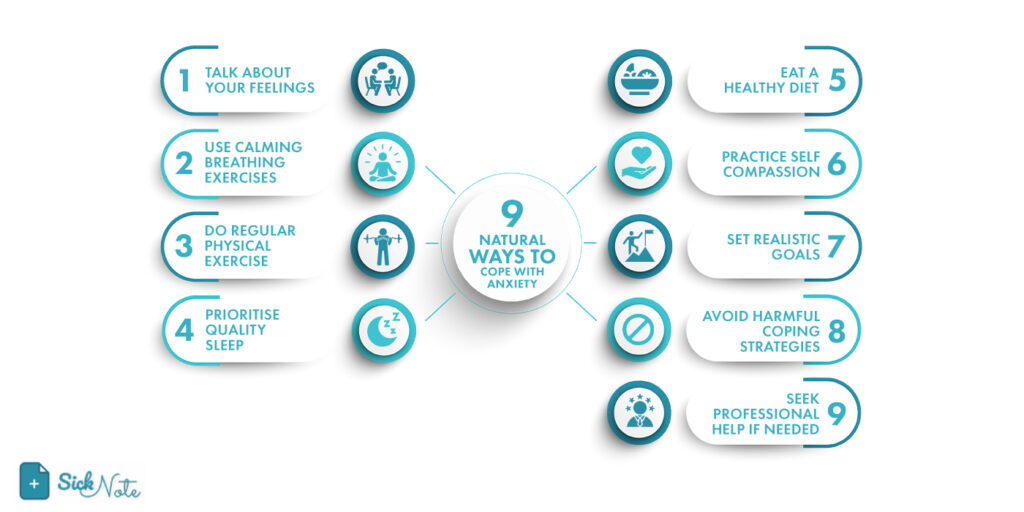Anxiety is something most of us deal with at some point in our lives. It affects people of all ages and backgrounds. There are many factors that can cause anxiety, such as work stress, health problems, relationship struggles, or even just the fast pace of life.
While anxiety is a natural response to stress, it can be overwhelming and can interfere with daily life activities. The good news is, there are many simple and effective ways that can help in coping with anxiety naturally.
In this blog we are going to learn about anxiety and some simple and natural ways to manage it effectively. It will help you improve your mental, emotional, as well as physical well-being.
What is Anxiety?
Anxiety is a natural response to stress. It is a sense of excessive fear, worry, or unease triggered by a variety of factors, including stressful life experiences, brain chemistry, and genetics.
Common symptoms of anxiety include:
- Rapid heartbeat
- Fast and shallow breathing
- Restlessness
- Difficulty concentrating
- Sweating
- Tremors
- Dry mouth
- Stomach problems
Anxiety can be different for everyone and different people may experience different symptoms.
Understanding anxiety is the first step towards managing it, whether through natural ways, support networks, or professional help.
Tips to Cope With Anxiety Naturally:

1. Talk About Your Feelings:
Talking to someone you trust can make a big difference in relieving your anxiety. You can open up about your feelings to a trusted friend, family member, a support group, or a counsellor.
Expressing your feelings can reduce their intensity and help gain perspective. It can also help lighten your emotional load and provide reassurance that you are not alone in your struggles.
You don’t need to have it all figured out to talk to someone. Just telling how you feel and letting it off your chest can be a huge relief.
You don’t have to share everything at once, you can start small. If you don’t know what to say, you can write it down first to clarify your thoughts and know what you want to say.
2. Try Breathing Exercises:
Anxiety often triggers shallow and rapid breathing, which can causephysical symptoms like dizziness, chest tightness, and a racing heart. Learning to control your breath is a simple but powerful way to help regulate your body’s stress response.
Breathing might seem too simple to make a difference, but it actually works. It can help calm your body’s “fight or flight” response. By slowing your breath you send signals to your brain that you are safe, which helps your body to relax.
Here are some breathing techniques that might help you:
- Deep Belly Breathing:
You can do this by inhaling slowly or deeply through your nose, allowing your abdomen to rise. Hold the breath for a few seconds then exhale gently through your mouth. Repeat this process for a few minutes.
- Box Breathing:
Box breathing, also known as square breathing, is a deep breathing technique that helps you relax and focus. To try this technique, breathe in for 4 seconds, hold your breath for 4 seconds, exhale for 4 seconds, and then hold again for 4 seconds. Repeat for several cycles.
- 4-7-8 Breathing:
It is a breathing technique in which you inhale for 4 seconds, hold your breath for 7 seconds, and then exhale for 8 seconds.
3. Do Regular Physical Exercise:
Physical activity is a highly effective natural way to reduce anxiety.
Ever notice how you feel better after a brisk walk or a workout? That’s because exercise makes your body release endorphins, the “feel good” hormones that lift your mood naturally. Exercise also increases blood flow to the brain, enhances mood and energy levels. It also helps in shifting attention away from your worries.
Aim for at least 20 to 30 minutes of moderate physical activity most days of the week. It doesn’t have to be intense, even light exercise done regularly can have a great impact on your mental health
Here are some physical exercises you can try to reduce your anxiety:
- Walking
- Running
- Cycling
- Swimming
- Yoga or Tai chi
4. Prioritise Quality Sleep:
Sleep is important for emotional regulation. When you are sleep-deprived, you are more likely to feel irritable, overwhelmed, and anxious. A good quality sleep gives your brain a chance to reset and recover, which is important to manage anxiety.
During sleep, your body repairs itself and your mind processes emotional experiences. Poor sleep can disrupt this process, creating a vicious cycle of anxiety.
Here are a few tips to get a good quality sleep:
- Aim to sleep for about 7 to 8 hours every night.
- Create a comfortable sleeping environment by making your room cool, dark, and quiet.
- Have a consistent sleeping schedule. Try to go to bed and wake up at the same time everyday, even on weekends.
- Make a calming bedtime routine like reading a book or taking a warm shower before going to bed.
- Try avoiding screens such as mobile phones and TVs before bedtime.
- Limit caffeine intake after mid-day or in the evenings.
5. Take a Healthy Diet:
The food you eat has a great effect on your physical as well as mental health. A healthy, balanced diet helps stabilise blood sugar levels, supports brain function, and minimises mood swings, all of which play an important role in reducing anxiety.
Nutrient rich foods supply your brain with the vitamins and minerals it needs to regulate mood and stress. On the other hand, eating poorly or skipping meals too often can mess with your energy and mood, making anxiety worse.
Here are a few things that might help you have a healthy balanced diet:
- Eat regular meals and avoid skipping them to maintain a stable blood sugar level
- Choose whole grains, lean proteins, fresh fruits and vegetables
- Limit caffeine and alcohol intake
- Stay well hydrated. Try to drink at least 8 glasses of water everyday or more if you are physically active
- Avoid excessive sugar by limiting intake of sugary foods and drinks
There are certain foods that are known to relieve symptoms of anxiety. You can add them in your diet. These foods include:
- Salmon
- Chamomile
- Almonds
- Blueberries
- Dark chocolate
- Yogourt
- Green tea
- Turmeric
- Eggs
6. Practice Self-Compassion:
It is easy to be hard on yourself during stressful times, especially when things don’t go as planned. However, harsh self criticism only adds to emotional pain and increases anxiety.
Self-compassion is a practice of treating yourself with the same kindness and care that you would offer to a friend.
Being kind to yourself reduces stress and boosts emotional resilience.
Here are some helpful tips to practice self-compassion:
- Speak kindly to yourself. Replace self-criticism with words of encouragement and support.
- Acknowledge and take pride in your small achievements, no matter how minor they seem.
- Let go of perfection. Cut yourself some slack, no one has all the answers and that’s totally okay. You are a human and perfection is not the goal, progress is.
- Acknowledge your emotions and allow yourself to feel anxious without shame.
- Remind yourself that you are not alone, many people experience anxiety at some point in their life.
7. Set Realistic Goals:
When you feel anxious, the urge to fix everything at once can feel overwhelming. This can cause frustration and burn out which in turn can increase your anxiety.
Learning to set realistic and manageable goals is an important part of reducing this pressure and moving towards productivity. Setting small and achievable goals also helps you gain momentum and confidence.
Don’t know where to start? Try these small steps:
- If a task seems too big, break it into smaller steps.
- Prioritise your tasks by making a priority list and avoid trying to do everything all at once.
- Be flexible in achieving your goals. Allow some room for adjustments and setbacks.
- Track your progress by keeping a journal or checklist. This can provide a visual proof of your efforts and remind you of how far you have come.
- Celebrate even the tiniest wins— each step matters
8. Avoid Harmful Coping Strategies:
When anxiety becomes unbearable, it is common to reach for quick fixes by using unhealthy coping mechanisms. These may offer a temporary relief but can cause dependency and other mental health issues. They can worsen your mental, emotional, as well as physical health.
Here are some unhealthy and harmful coping mechanisms that you should avoid:
- Alcohol
- Cigarettes
- Drugs
- Gambling
9. Seek Professional Help If Needed:
While natural remedies are effective, sometimes anxiety requires professional support. A professional therapist can offer treatment options tailored to your specific needs.
Knowing when to seek help for anxiety can help in proper and timely management of your condition. Seek help for your anxiety if:
- It is interfering with your daily life activities
- You are having physical symptoms of anxiety
- You are experiencing panic attacks
- You feel hopeless or depressed
- You are using unhealthy coping mechanisms
Remember, asking for help is a sign of strength, not weakness!
If you or anyone around you is suffering from anxiety, you can contact Find a Helpline to get help and support for anxiety.
Conclusion:
Anxiety may be a common experience but it doesn’t have to control your life. By incorporating some simple ways in your daily routine that can help cope with anxiety naturally, you can take charge of your well-being. Be patient with yourself and seek help when needed.
Take it one day at a time. Healing isn’t linear, and that’s okay!








